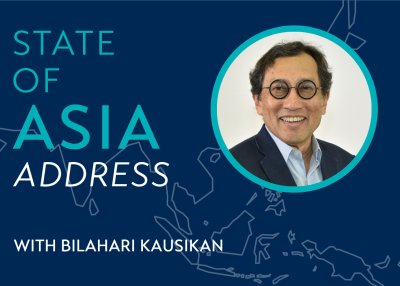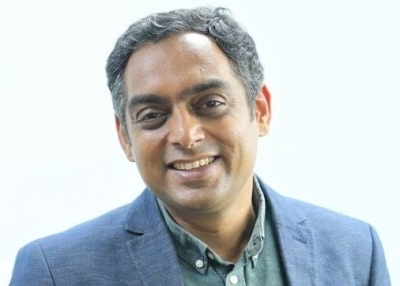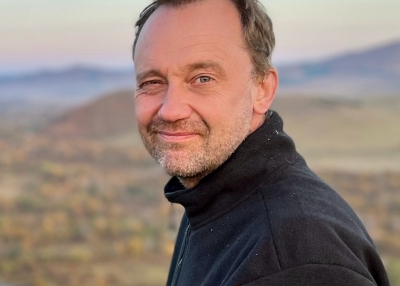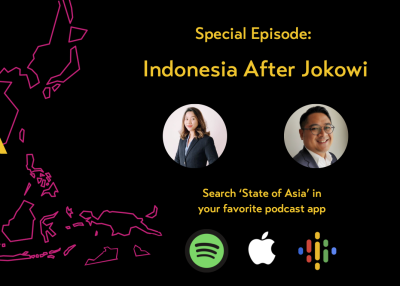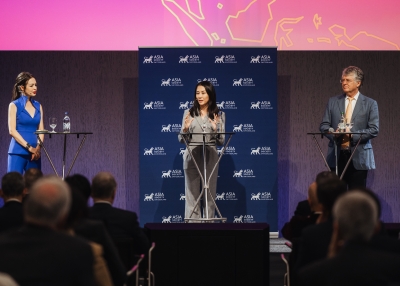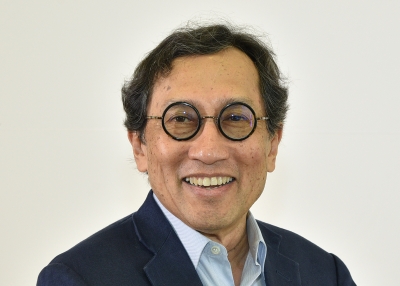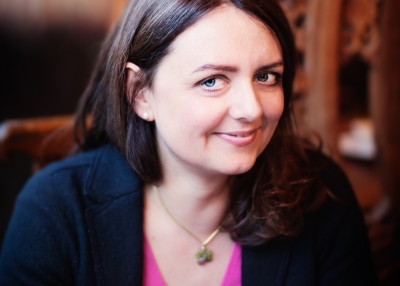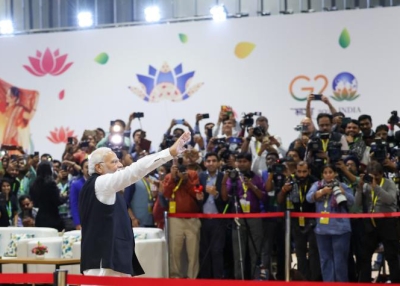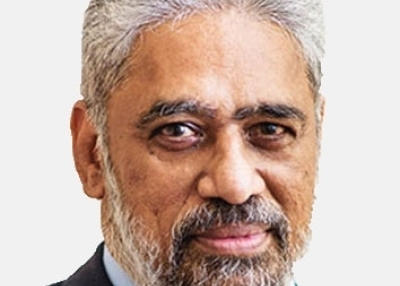State of Asia with C. Raja Mohan
The view from Asia on the State of Europe
GUEST ON THIS EPISODE
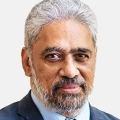
C. Raja Mohan is Senior Fellow at the Asia Society Policy Institute in Delhi, India. He is also a visiting professor at the Institute of South Asian Studies of the National University of Singapore, and he was the founding director of the India Center of the Carnegie Endowment for International Peace. He served on India’s National Security Advisory Board and has published widely on India’s foreign and security policies. Raja is also a columnist for Foreign Policy and the Indian Express.
In this episode, Raja gives his view from Asia on the State of Europe. He explains why he's troubled by Europe's inability to take charge and measure up to the many challenges playing out within and at its borders. He implores Europe to stop ignoring what's happening in the rest of the world, to recognize the dangers of its decline, and to rethink its strategies. "The party is over. Come back to the real world."
In November 2022, Raja gave the inaugural State of Asia Address in Zurich, Switzerland. This year, that keynote speech will be given by veteran Singaporean diplomat Bilahari Kausikan, on November 21, at the University of Zurich. This event is open to the public. Info and tickets here.
STATE OF ASIA podcast
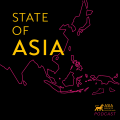
Season 5, Episode 4 – published October 31, 2023.
Host and Producer: Remko Tanis, Programs and Editorial Manager, Asia Society Switzerland
Associate Producer: Manuela Coldesina, Operations Manager, Asia Society Switzerland
Find previous and future episodes here, on Spotify, Apple Podcasts, Google Podcasts, or search for 'State of Asia' in any other podcast app. We're also on YouTube.
Transcript
00:00:03 Remko Tanis
From Asia Society Switzerland, this is State of Asia. I'm your host Remko Tanis.
00:00:09 Remko Tanis
Today, we're shaking things up a bit. Instead of discussing what's playing out in Asia, we're going to talk about the state of Europe, but, we couldn't resist, the state of Europe as seen from Asia. How do leaders and thinkers in Asia see Europe? Is the continent still relevant? Where is its mind? What about the way Europe is handling the many crises playing out both within the region and right at its borders?
00:00:39 Remko Tanis
To talk about this, I'm joined by C. Raja Mohan, Senior Fellow at the Asia Society Policy Institute in Delhi, India. Raja is also a visiting professor at the Institute of South Asian Studies at the National University of Singapore, and he was the founding director of the India Center of the Carnegie Endowment for International Peace.
00:00:59 Remko Tanis
He served on India's National Security Advisory Board and has published widely on India's foreign and security policies. He's also a columnist for Foreign Policy and The Indian Express.
00:01:09 Remko Tanis
In November 2022, Raja gave the inaugural State of Asia Address here in Zurich, Switzerland. This year this keynote speech will be given by veteran Singaporean diplomat Bilahari Kausikan on November 21st at the University of Zurich.
More info on that at the end of this episode. But first, Raja Mohan, welcome back to State of Asia.
00:01:30 C. Raja Mohan
Thank you. It's wonderful to be back.
00:01:32 Remko Tanis
Last year, you delivered the inaugural State of Asia Address here in Zurich. It's a speech which gives a broad assessment on key issues and challenges in Asia, and provides a view into where things may be headed. Now to begin our conversation today, and I think this is a first on this podcast, I'd like to have the you from a year ago introduce the question to present day you.
00:01:52 Remko Tanis
I'm going to play you a fragment from the opening of your speech from last year. I hope you can hear it. This is how you opened your State of Asia Address in Zurich, last November.
00:02:00 C. Raja Mohan
You know I've been pinching myself the last 24 hours since I've been here. If I've come to Europe all the way, I mean, I would rather have talked about Europe, you know. In a way, Europe is in the middle of an extraordinary crisis for the first time since the Second World War. I mean, though I make a living by writing and speaking about Asia, I'm deeply fascinated by and troubled by what's happening in Europe.
00:02:24 C. Raja Mohan
But one of my own conclusions this evening, is what happens in Europe matters to Asia and Asia will matter more and more to Europe.
00:02:34 Remko Tanis
So, it's a very broad first question, Raja, is that still your sentiment now and what developments specifically are fascinating and troubling you about what's happening in Europe?
00:02:43 C. Raja Mohan
I think undoubtedly the Ukraine war and the way it has unfolded as the tragedy mounts on the ground, what is really troubling is the inability of Europe to be able to really take charge of the situation.
00:03:00 C. Raja Mohan
That it is still so dependent on the United States and if politics changes in the United States, then Europe's fate is not going to be nice and I think this is where Europe...
00:03:12 C. Raja Mohan
...is so rich, is so well-resourced, so I think it's very, very important, I think, for Europe to really take charge of its security.
00:03:23 C. Raja Mohan
I'm not saying walk away from the United States, but I think it should have been in the lead. When you have a war in the heart of Europe, but unfortunately it is really, even the Russians said if they want to do a peace talks, they are going to deal with the Americans rather than with the Europeans. So, this really very, very unfortunate situation with the second largest economic entity, one of the richest parts of the world...
00:03:44 C. Raja Mohan
...cannot deal with states which are undermining the status quo, which are really... Russia is about one-tenth of Europe’s size and that Europe is helpless is really shocking and I think it really reminds all of us how important it is to have the capacity to defend oneself, which is the core of sovereignty.
00:04:10 C. Raja Mohan
So when the European friends talk about European sovereignty, it will be meaningless unless there is a real effort to strengthen Europe's defenses.
00:04:12 Remko Tanis
So what is it then, that according to the view from where you are in in Delhi, Europe or individual European countries should do to take things, to take charge, as you say?
00:04:21 C. Raja Mohan
No, there've been bits and pieces of European assistance to Ukraine, but, I think it's really, they're not in the driver's seat.
00:04:28 C. Raja Mohan
The EU or through NATO, I mean where the European contribution has been slow and hesitant and really as a way of keeping their alliance alive and I think what you need is the main powers of Europe, France, Germany, Poland and others to sit down and say, look you are in the middle of a very grave situation that you cannot leave your fate to politics within the United States.
00:04:48 C. Raja Mohan
Historically the US has had a strong commitment to Atlantic security, European security. But if the isolationists are due to come on top in the next election by shear accident you would be in a situation where Europe is in the middle of war but has no plan.
00:05:04 Remko Tanis
British historian and professor of European Studies at Oxford, Timothy Garton Ash, just published his new book, Homelands. It's written after Brexit, after the Russian invasion of Ukraine. After the rise of hard-edged populism in in Europe with the immigration crisis, mixed handling of COVID, mediocre leadership, skepticism playing throughout Europe, he is quite bleak in his assessment of where Europe is at. He says in his book pretty much it comes down to Europe as a whole full and free region might just be a mirage. We can't count on that anymore. Do you share that bleak assessment of his?
00:05:36 C. Raja Mohan
No. I think the situation is grim, but I think we shouldn't give up at this point because I'm still hopeful that Europe will find its own, you know, will take charge of its own destiny and would not simply melt away in the face of the kind of hardship. Because Europe that goes under will make Asian security that much harder.
00:05:57 C. Raja Mohan
If Europe loses at this point, it cannot deal with the Ukraine situation, it's a huge incentive for China to disturb the status quo, and in fact, China is far more powerful than its neighbors. Unlike Russia, which is economically weaker than its Western European neighbors.
00:06:08 C. Raja Mohan
So this would embolden China to further more assertive, more aggressive in the region. Therefore, we want Europe to succeed. We in Asia want Europe to succeed in securing itself.
00:06:20 C. Raja Mohan
And I think Timothy, and I have the chance to read the book, I think it's done with great feeling. You know, he's been a great enthusiast for Europe and for those of us who followed him in the fall of the Berlin Wall and inspiring the way he thought about Europe at that time, but today's situation is really the opposite. But my sense is we would want to see Europe come together, defend itself and then even contribute to Asian security because if Europe does well in its own region, we'll also be able to tilt the scales in Asia.
00:06:52 Remko Tanis
You mentioned in your speech in Zurich last year, you said, now for the first time some of us in Asia are saying look we like Europe to come back, we can't produce a stable architecture in Asia without Europe participation and you also said we don't want to be at the goodwill of the US political class or the Chinese Communist Party. What exactly is it that Europe could contribute to a stable architecture in Asia?
00:07:13 C. Raja Mohan
I don't think in Asia we expect Europe to bring its troops marching down into Asia or bring its ships to South China Sea or East China Sea or patrol the Malaka Straits, or secure the Indian Ocean. I think that's not it. What we're looking for in Europe is that raises its voice in Asia against aggression, against territorial revisionism of the kind that Russia is doing in Europe and China is doing in Asia. It would immensely add to the larger argument in Asia.
00:07:44 C. Raja Mohan
Of course, I think what is disappointing, of course, is the fact that all the Europeans say that, look, we're not, you know, they're not sure about China. They all have business with China and it's even more ironic for us to hear that Europe, those who say they want strategic autonomy from the U.S. say, look, we're going to show the strategic autonomy on the China question, which is, look, we're going to keep us free to make our own money in China. So, I think that makes it worse for us. But I'm sure that debate is not settled in in Europe. So, Europe can bring its normative power.
00:08:20 C. Raja Mohan
Europe can also come in and help China’s neighbors in Asia to develop the capabilities, the resources to stand up to local aggressive, which is what I think Europe can do because it's just in a very rough...
00:08:31 C. Raja Mohan
...I mean, among the very few countries that make and sell submarines, America makes submarines but does not sell them. It's really Europe. I mean, you have the French, you have the German, you have the Spanish you have, you know, Swedish, you have so many submarine makers. So, Europe has the capacity to make a difference to the balance of power even on the hard power terms provided it generates the right policies.
00:08:53 Remko Tanis
But what in your view is then the biggest hurdle standing in Europe's way to make these steps and to get engaged more and to have more countable cooperation with countries in Asia?
00:09:02 C. Raja Mohan
I think it's well known that, look, Europe is divided within itself. The project of constructing European unity has succeeded enormously in the economic domain, but in the political security domain, I mean it remains a work in progress.
00:09:15 C. Raja Mohan
And I think this is where Europe's ambition, it is the current Commission in Brussels, the ambition to become a geopolitical Commission. I think that ambition was appropriate. It came at the right time, but I think they've not been able to... The challenge that whether it is in central Europe, in Ukraine or whether it is in the Caucasus or whether it is now increasingly in the Middle East. So, I think this is Europe’s geopolitical opportunity and that strengthening its common security, and foreign policy, pooling their resources far more effectively to deal with aggressors in Europe and elsewhere.
00:09:49 C. Raja Mohan
And to develop policies to support those who are standing up against aggression in the rest of the world, there's a huge agenda, but Europe has the resources and capabilities to do that, provided it signals a minimum of geopolitical unity on how to deal with these issues.
00:10:05 Remko Tanis
You mentioned a renewed tense situation in the Middle East that has been added to, of course the tension with Ukraine-Russia war. Now, after the initial condemnation of the terrorist attack of Hamas on Israel, you see kind of Europe being split once again over how to respond, with countries in Eastern Europe clearly supporting Israel without questions asked.
00:10:24 Remko Tanis
Other countries, especially in Western Europe, seem concerned with the Palestinian cause as well, and now, at the same time, we see a brouhaha brewing in Brussels over just more inside political things. For example, EU Commission President Von der Leyen’s visit to Israel a week after the terrorist attack. Her taking charge of foreign policy without consulting the European capitals. Doesn't this seem like infighting without taking or focusing on the relevant things that should be focused on, from where you are?
00:10:52 C. Raja Mohan
Exactly. And I think in the Middle East... It is easy for Europe to take high moral ground without having to engage itself directly in the challenges, because the real world is not the neat post-modern universe that Europe thought it was living in and its ability then to connect to the real world has all you know, has found it constantly problematic because Europe believed it had entered a different era.
00:11:15 C. Raja Mohan
What is called by Borrel the Garden, but didn't know how to deal with the jungle, if you might continue with this metaphor. But there's a jungle out there.
00:11:23 C. Raja Mohan
Borrel was right on that whether we are creeping up on Europe or not, but there is a jungle.
00:11:28 C. Raja Mohan
You've got to know about the jungle. You've got to know about how life works there, and that if you want to protect yourself from creeping jungle, you have to be able to handle the jungle. And I think this way Europe's big intellectual failure has been the idea that you can offer normative solutions or hector the non-Western world on what is best for them, without actually seeing how the kind of stage of development, the rest of the world is.
00:11:55 C. Raja Mohan
It took 400 years for Europe to get where it is. And the rest of the world sees evolving struggles of modernization, the struggles against religion, the struggles to build a modern state system, question of dealing with minorities. All this has been part of Europe in history.
00:12:10 C. Raja Mohan
But then Europe stopped and told the rest of us in the last 30 years, oh, guys, we know it all. Here are the rules. You follow it? So that was really, neither was it effective nor was it consequent. So, I think Europe must become not only geopolitical, but it must become realistic in appreciation for the where the world is. And for God's sake, protect your own interests. We're not saying come and help us, but protect your own interests and in the process, you can engage with your like-minded partners, other allies in the region, rather than putting yourself apart on hyper, distance and hoping like hell that the creepers from the jungle won't come.
00:12:47 Remko Tanis
What's your view then from India, from a country that especially this past year has taken significant steps in growing its global clout and you say, well, it took Europe 400 years to get where it is now, but India is of course moving much faster than this.
00:13:00 Remko Tanis
Any advice then from how Europe could maybe speed up its strategic seriousness or to be taken seriously by others?
00:13:09 C. Raja Mohan
No. Well, my sense is, you know, I mean I think you know, we're really not in a position to advise Europe. I mean, Europe's experience, its state craft, all of us still live by European classics and European statecraft and the European history, but I think Europe, I think, needs to take a deep breath, look back at the world and say, where is the world going, what are the challenges in a way that Americans do all the time.
00:13:31 C. Raja Mohan
They also do moral politics when it suits them, but they're also very, very, you know, they balance it always with the realpolitik in a sense. But Europe, I think had become too tilted to one side. Second, I think Europe must also recognize the dangers of its trajectory, that it's in the danger of relative decline, both in demographic terms losing clout to the US and to rising powers of Asia.
00:13:55 C. Raja Mohan
Therefore, I think it needs to rethink its own strategy. In a in a, you know that look, these are the broad trend lines. Since the world is changing, Europe's position in the world is changing. The advantageous moment Europe had post-1991 is under stress, so therefore you need new ideas. You need new ways of relating to the world.
00:14:16 C. Raja Mohan
3rd, I think the demonstrations we saw in Europe in favor of the Hamas, the kind of moral equivalence come on a range of issues. The what, whether you call it wokeism, whether you call it political discourse without a reference to realities on the ground, I think that has gone too far. I think Europe has to come to terms with this, that, that this is not something that you thought none of this really changes the fundamentals. We are in the middle of a danger given Europe's geographic location, its neighborhood.
00:14:49 C. Raja Mohan
And the challenges it faces were no longer just from the aggression from the East, chaos in the South on detachment from the West, across the Atlantic. I think it puts Europe in a very, very different situation for the first time in 80 years. So, I think Europe really needs to sit up, get down to fundamentals and shed a lot of the shibullash if you will, since we talk about the Middle East, that are kind of become so ingrained into the European mind set.
00:15:16 Remko Tanis
Is there any country within Europe that jumps out of you, maybe in a positive way or maybe in an extremely disappointing way that you say, well they've really either found their tracking out on their own outside of the EU machinery or is fighting below its weight and could do much more, but just...
00:15:33 C. Raja Mohan
As a collective, I mean, I think I see, you know, Britain with its Anglo-American connection. I mean, I have traveled this year quite a bit in Europe, at least in the Baltics. They like Britain, Britain still brings in the old Anglo-Saxon realpolitik security orientation which, I think, central Europe, certainly Germany, had lost a lot of.
00:15:54 C. Raja Mohan
That while France has that realistic tradition deeply ingrained, I think it is kind of trying to fight on too many fronts. I mean, autonomy from the US or integrating Europe or dealing with the old imperial role in Africa. They need to calm down and say, look, which is the priority, what are the... How do we build ourselves? That is the fundamental question, because if you don't hang together, if you don't build yourself up as a collective...
00:16:20 C. Raja Mohan
there are forces now that will either by detachment like the Americans, can make you weaker, or by active division, the kind that Russia is trying, and the surging chaos from the South that can really dull the senses of strategic challenges in in Europe.
00:16:37 Remko Tanis
It's been almost a year since you spoke to us here in Zurich. In that year, would you say, is Europe still taken as serious as it was a year ago in in India in other parts of Asia or is the decline of we have to take into account what Europe thinks and is prepared to do, is that just declining?
00:16:55 C. Raja Mohan
No, the decline is real, but my sense is that that's not the end of the story. This is not an irreversible trend line because I think the kind of crisis that’s engulfing Europe I think will eventually hopefully will concentrate the minds of Europeans that that the party is over, the Sabbath is over and that it needs to come back to the real world and to deal with the world as it is.
00:17:18 C. Raja Mohan
And within that, with all the limitations, with all the difficulties that as a, it's not a political community, but within those limitations, you need to begin to do things because it's not just Ukraine or the technological front on the range of issues you have.
00:17:34 C. Raja Mohan
The US is moving ahead. The US is investing policy, reclaiming the old capabilities, while the mantra of globalization has denuded in the last 30-40 years. So, I think the one the end of globalization, the rise of new technologies and the geopolitical challenges, the three of them have come together, so, I think this is a really urgent moment for all of us and for Europe in particular, because it's not a single political entity.
00:18:00 C. Raja Mohan
It needs to work that much harder to deal with it.
00:18:03 Remko Tanis
I'm talking to you from Switzerland, so I gotta ask. Where does this country feature on the radar of the list of things that are paid attention to in India? Is is it even on there?
00:18:13 C. Raja Mohan
No, no, it's absolutely. I think small is beautiful as we say and not just in terms of Switzerland’s beauty. But you know India, there is a recognition today that even the smallest European country has something to offer for India. That Europe's rich traditions, culture, technology, education, knowledge, it is kind of is in every corner of Europe.
00:18:33 C. Raja Mohan
So I think India, at least there's a recognition today we need to spend more time engaging in smaller countries of Europe. For example, today we're engaged with EFTA on a free trade agreement, not just with the EU.
00:18:42 C. Raja Mohan
On technology cooperation on education cooperation, there's much that India can do with Europe and I think each of the small Europe, on the green transition with the Nordic countries.
00:18:53 C. Raja Mohan
On the maritime areas with Europe's long, you know, Netherlands and other countries or with the Mediterranean where our security, their security begins to overlap. So, my sense is there is much smaller countries we need to do a lot more. In the past I would say blame India for ignoring the smaller countries but today I sense there is greater awareness, but I think we need to create the mechanisms and channels for stepping up that that kind of an engagement between India and the smaller countries and Switzerland with its historic policies of neutrality in some in some ways similar to India's past of non-alignment I think we need to sit together and see if, amidst the conflict times, can countries like ours to help to dampen, to reduce the dangers that again I think is a new possibility especially between India and Switzerland.
00:19:43 Remko Tanis
Is there a way in which Europe could compensate its lack of the ability to project more hard power to compensate that with soft power? Is there a strong soft power appeal, at least from Europe to Asia towards India?
00:19:56 C. Raja Mohan
You know soft power. You know the definition of hard power includes both military as well as economic and technological. Soft power is purely attractiveness. I mean, Europe has a lot of it, but I think as I said, Europe does not have military power. That's one dimension of hard power, but it has enormous amounts of economic power, which is also hard power, technological power, which is also hard power. So, my sense is that Europe begins to use that and so saying we don't have hard power, you have at least 2 dimensions of hard power.
00:20:21 C. Raja Mohan
Having a strong partnership with a country like India where you can maximize those elements, say for example, well, Europe's participation in India's defense industrialization can benefit European defense industries, advanced technology industries. At the same time are contributing to a new architecture of Asian security, so I would say even within the hard power domain there is much that Europe can do.
00:20:46 Remko Tanis
I'd like to, for a moment, ask you about the reaction of the Indian Government and of Prime Minister Modi of course, to the events playing out in the Middle East, because shortly after the first attacks by Hamas on Israel, Modi came out with a statement proclaiming solidarity with Israel. At the same time, for example, China kept it a bit more at bay, issuing statements of deep concern, calling on all relevant parties to remain calm and constrained.
Historically, India has friendly ties with both the Palestinians and Israel, and it seems to have grown closer to Israel under Modi. It seems that Modi's statement was a clear choosing of sides in in this ongoing conflict different than, for example, when Russia invaded Ukraine in March 22. What is your take on India's position in in this new war that we're seeing.
00:21:27 C. Raja Mohan
I think India was right not doing this two-sided or both sides kind of an easy way out of a difficult situation, because I think that in this case this notion that you have to be on one side or the other that is fundamentally wrong. My sense is terror has to be condemned unambiguously, that the notion of terrorism is that you kill innocent people and that any amount of higher cause being cited cannot justify use of violence against innocent people.
00:21:58 C. Raja Mohan
And that India as a victim of that has had no difficulty in seeing that clearly that look what's happened is wrong and that Israel needs to be and at the same time, India has also been a strong support for Palestine, I don't think there's any dilution of that position, that is you can be against terror, you can be at the same time a supporter of statehood for Palestine and a 2-state solution.
00:22:24 C. Raja Mohan
So this framing of the problem as you have to be either one side or the other, which is what I see in Europe and North America is, I think that's fundamentally wrong. While well, what India has done is really take a principled position on both the issues and as it turns out it also suits our interests at this point, I mean, just as in Ukraine, given our specific relationship with Russia, there was a hesitation. We didn't endorse the invasion, but there was a problem in terms of how India dealt with. But in the case of Middle East, yeah, our interest in fighting terror is quite central. Terror fighting terror is quite central.
00:22:57 C. Raja Mohan
At the same time India is also, it's in very deep partnership with the moderate secular, moderate, modernizing Arab regimes, and that includes the Palestinian Authority, Egypt, Saudi Arabia and the United Arab Emirates. So, I think once you disaggregate the Palestine that there is Hamas and there is Palestinian Authority. But if you fuse those and mistake Hamas to be Palestine or Hamas to be representing Palestinian interests, and that's where I think most of these people are making a mistake.
00:23:25 C. Raja Mohan
Hamas, its ideology, its actions, there's no way. I mean India can accept them or want to see them being them being promoted, forget in the Middle East or beyond, beyond Middle East. So, for us, a return to moderation in Israel and an Israel, that actually works with the moderate Arab regimes and empowers Palestinian Authority. And I think one of the great tragedies has been Israel believed with the current leadership, Mr. Netanyahu believes that he can build a new Middle East by ignoring the Palestinians in general, and then short changing the Palestinian Authority, which is your natural partner.
00:23:58 C. Raja Mohan
So, this is what has to change and I think that's the direction I see at least Biden diplomacy now in the region is showing. So, I would say that for India, I think India has done the right thing and not fudging the issue or playing geopolitics with it. I think what we're saying is clearly terrorism is terrorism is unacceptable and we continue to demand a Palestinian state and we want a coalition of moderate states in the in the Middle East.
00:24:26 Remko Tanis
Thanks very much, once again, Raja Mohan. Thank you.
00:24:29 C. Raja Mohan
Thank you. Thank you. Wonderful to be with you.

